Chapter 5: Interview With The Vampire, Episode 3: "Is my very nature that of the Devil"
Louis embraces more than one part of his nature, Lestat is non-discriminately pushed to his limits, and the tensions between all reach a breaking point. Or a rebirth?
“Take a Black man in America, make him a vampire, fuck with that vampire, and see what comes of it.” — Daniel Molloy
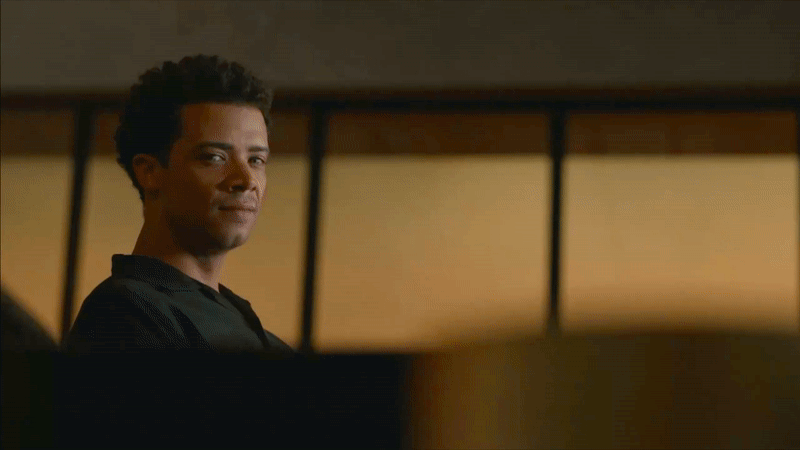
Welcome back to the third installment of my Interview with the Vampire recap for Spooky Season 2023! If you need a refresher, please feel free to skim through my recap of episode one and episode two!
[spoilers from here on]
Two words this week: Bad Daddy.
Why do we relate to Louis? Because he’s compassionate, empathetic, and cares about people. He possibly cares more about people even after he’s become a vampire, his scope of all things deepening. When he questions if his very nature is that of the devil—even we as humans can relate to that pondering, whether personal or on a grand scale.
This episode starts peacefully, almost like a sitcom—pleasant music, lovers reading on a bench, nice weather! But this is cut short when Louis calls out the uncovered racism in the book Lestat is reading. Perfect foreshadowing for what’s to come.
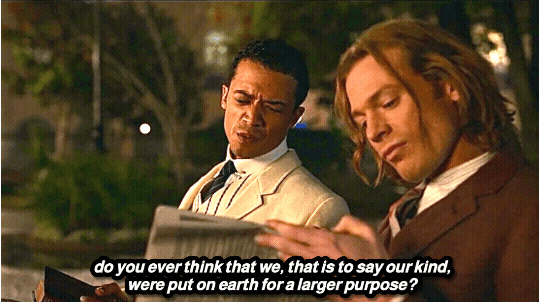
As they debate the “larger purpose” of vampires that Louis so desperately seeks to find, them being “born” of humans, Louis questions his and their collective nature. Lestat resists but then indulges Louis in this attempt to justify humans as food. Louis thinks he can feel better killing bad humans—like a vampire Dexter—but when Lestat paralyzes a “bad” person, Louis still grabs a nearby cat. As Lestat says, “They’re all capable of abomination.”
“I put you on this earth. Your purpose is to enjoy yourself.” — Lestat de Lioncourt
Lestat knows that Louis has suffered enough, but Louis still clings to his mortality years after his turning, still a phantom of his former self. Lestat has been a vampire for so long he’s clearly forgotten what it’s like to be human. Lestat runs off instinct while Louis searches for reason, which Lestat dubs “a set of leg irons,” something that will keep Louis trapped and hold him back from his full potential. As Lestat grows impatient, I wonder if he doesn’t like Louis seeking morality in his murder because then Lestat would have to face his own morality and reason, or if he truly couldn’t be bothered and accepted his rebirth long ago. Maybe it’s triggering for him in a way we don’t know yet.
Back to the present, Daniel questions the truth of the first interview vs. now and why Louis speaks of Lestat so differently, calling it a “total rewrite.” It’s clear he was angry at Lestat back then. Is now the more nuanced tale, as Louis says, or more rehearsed, as Daniel suggests? Daniel even describes Lestat as an abuser, calling out that the abused can still love their abuser, that Louis is perhaps romanticizing all of this, “like you were locked up in some fucked up gothic romance.” Louis challenges Daniel’s recollection of events from his own memoir, leveling their playing field further. In the same scene, Daniel dumps the tapes and deletes the files off his computer (WHY!), and Louis shows that his powers have grown exponentially by setting the tapes on fire with merely a look. They’ve made a silent agreement, or are they just one-upping each other?
Lestat, disappointed in Louis for rejecting his new life (which Lestat takes as a rejection of him as well), takes his frustrations out on the piano player in Louis’ employ. He quickly turns it into a playful moment and Louis’ narration reveals that he was actually helping Louis in this moment (it’s also a nice reprieve for the audience). This is his way of apologizing or trying to keep Louis on a hook. To Lestat, Louis not wanting to kill humans means that he rejects this life with him. Louis lives off rats, his life essence more depleted than usual. It’s clear that Lestat is threatened, and instead of expressing his fears and desires to Louis, he brings a woman home.
Not any woman: Antoinette, a singer from the Azalea. She and Lestat are cozy on the couch as Louis sits aside. She questions their relationship, confused by Lestat coming onto her. “I do everything for Louis,” he says, showing his bitterness. They trade jabs at each other with an audience—Louis telling Lestat and Antoinette to, “Enjoy yourselves. It’s the purpose of livin’.” Why not a chord? Why not a cluster? Lestat has the privilege of getting to enjoy himself fully, and as this existentialism has gone on for 7 years now, is it any wonder why he’s tired? Is Louis not tired? How long is 7 years in vampire time, anyway? It’s clearly shorter if he was still processing their relationship 50 years later to Daniel in the 70s.

Louis comes home to a burning body, presumed to be Antoinette’s, but Lestat shares that he didn’t kill her because she has “talents.” Louis is calm and handles his jealousy by asking questions instead of lashing out. He asks, “Aren’t I enough?” to which Lestat laughs a cruel, mocking laugh, despite following up with a seemingly sincere declaration of them being together for hundreds of thousands of nights, defends his behavior by calling it protection for them (could be partially true!), but also dropping that yes, he likes variety (which Louis already knew when he said “non-discriminating” but that is not the same thing as polyamory or cheating, especially when things aren’t so great between them, it just deepens the feeling of rejection), and declares that they can open their relationship up to others. For both of them, not only Lestat. “Of course, of course, of course—as long as you come home to me, of course,” Lestat says through gritted teeth.
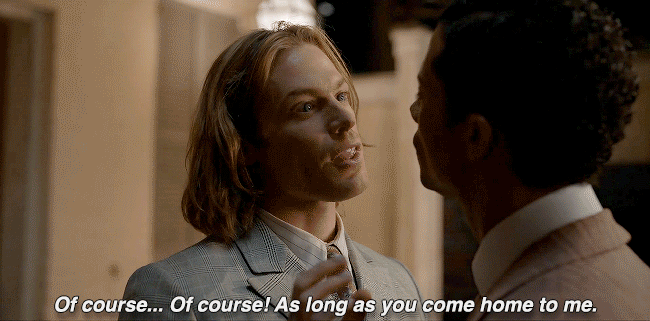
Despite their pettiness, the way that Anderson and Reid portray these two characters truly makes us believe in their romance, even if it can be quite volatile. I think many of us can see their dysfunction and still be hopeful that they come out on the other side, healed and in love. From the bit of commentary I’ve read online from those who’ve read the books, it seems that these characters are all horrible people, and yet, we love them, we root for them, we want these two together. Well, most of us. It feels wrong, but the way that horror and specifically, vampires, can be such great allegories for the human experience and trauma we endure is perhaps why we are so drawn to them. We see pieces of ourselves in them and their experiences. Combine this with the Hollywood “end-game” trope and we are hooked. Who doesn’t want Louis and Lestat to be end-game? Can Lestat get it together so we can root for him and them?
Louis does not immediately chase someone else post their agreement, but someone from his past does arrive, under Lestat’s watchful eye at the Azalea. We see a glimpse of Louis’ past for the first time in the present. After Louis has another heartbreaking moment with his family where they finally see his supernatural strength and reject him further, Lestat reacts to what it feels like to lose control. How does he pay Louis back for his “transgressions” with Jonah? By inviting the entire army in town to their home, the Rue Royale. I don’t believe Louis hooked up with Jonah out of revenge. I think it felt natural, especially considering their open relationship discussion. His and Lestat’s unequal power dynamics, Lestat’s temper, their frequent bickering—it is “a lot” for Louis, as he says. His escape with Jonah, even for the night, is not unwarranted.
I love the scene of Louis’ coming home to this pre-orgy for many reasons, and we have to pay close attention to really catch all that is happening. We see the brat in Lestat as he claims he invited all these soldiers over so Louis could “fuck them” and he could “eat them,” his jealousy oozing out with an odd tinge of sincerity. I must marvel at Sam Reid for a moment. What he pulls out in this scene is not only fun to watch but forces us to go along for the ride and feel Lestat’s many emotions at once. He’s playing the piano, singing along with the soldiers—putting on a performance, literally—of not only the music and singing but actually enjoying spending time with these men—all to set up a scene for Louis to come home to a message.
He did the same in the book with the two sex workers, who are both in the film if you remember the coffin scene. In the film, Lestat says “You are a killer, Louis” after killing the two women (in which Louis is present but does not participate), while in the show we get these two Lestat-isms (the playing with his food [ie. the tenor], the show for Louis) in two different episodes, letting us see the unraveling of his nature more over time to savor it, or be disgusted by it, or both.
“What can I say? I’m a lot. I’m not perfect.” – Lestat de Lioncourt
One of my favorite mini moments is when Louis asks, “What about the coffin room?” Lestat cleverly responds, “Well, that would require curiosity and intelligence. All these murderous slobs want is more wine and a German on their bayonets! Kill the Hans!” The performance of this line is *chefs kiss* because it shows that Lestat could give less than two shits about these American soldier’s goals—perhaps with no personal investment in the war—or any human affairs. Being someone who is anti-war myself, I just revel in the mockery of it and Reid’s delivery.
“Well, now that I know you have a type, I thought you’d be pleased,” says Lestat. Louis clearly is not, and Lestat’s expression shows more rejection and disappointment—a wit’s end. Lestat reveals a more sophisticated superpower to Louis and the audience by forcing the men to leave with only his mind after Louis demands it, which clearly takes much strength as it causes him to start bleeding from his ears. How dare Louis refuse this gift: not one, but many men to choose from? I wondered here if Lestat’s reaction is a trauma response. Like, I know this will hurt me, so watch me suffer since you rejected my offering. What is also revealed is more anger and angst than we’ve seen all season.
When the soldiers are gone, Lestat ends yet another performance by singing, quite eerily, “Boy oh boy, where do we go from here?” His throat gives out, voice cracking, and Louis is too angry to not only play along with these games and tricks but also to see Lestat’s desperation to be loved unconditionally, to be chosen, bubbling under the surface of all of this impulsive behavior. It’s not Louis’ job to uncover this for Lestat, either. Where do they go from here when it all feels quite tumultuous and spiraling?
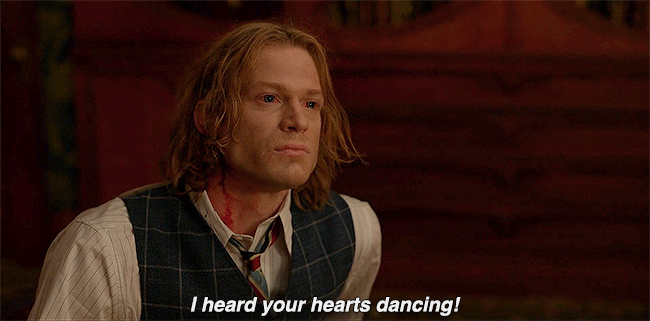
As long as you come home to me becomes… I heard your hearts dancing!!! since he senses that there are actual feelings between Louis and Jonah whereas Lestat allegedly only feels physical ones for Antoinette. Their mutual unhappiness reaches a boiling point, all revealed here. Bombs are dropped: Lestat reveals this way is not a life, he’s unhappy with the way Louis is surviving, not thriving—that he doesn’t like to share (oh? I guess this desire for variety doesn’t go both ways after all!). Louis drops quite a hurtful one on Lestat: You took my life, and now I’m about to lose the last thing I care about, which isn’t you, by the way, it’s my business. I just know Lestat is thinking, what about me? but he doesn’t say it with words, only the disbelief and anguish painted across his face.
Despite all this, I appreciate Lestat standing beside and behind Louis when it comes to confronting Fenwick and Anderson, two of the men who are part of the targeting of Black-(and queer!)-owned businesses. Despite Lestat being fairly blind to race in many instances, including their queer interracial relationship, he also pulls these moments out of rejecting whiteness and patriarchy that I really love. Now, this is a very minor instance, we’re not going to act like this is some huge declaration. Though in this moment, Lestat using his voice to express what Louis may not be able to, is vital. Louis still keeps his anger at bay but summons the strength to confront Tom Anderson, even if it’s thwarted by Fenwick.
When your mother sees the devil in your eyes, it’s a hard assessment to abandon. Am I from the Devil? Is my very nature that of the Devil? I had hedged against the question, but now it completely overwhelmed me.” – Louis de Pointe du Lac
Louis is reaching a breaking point in his life. Grace is finally part of his family dismissal, and his relationship lacks honest intimacy and is shrouded in passive aggression, miscommunication, and emotional abuse. Even his career is being stolen from him. Everything is out of his control and it’s hard to watch because we know that Louis doesn’t deserve this. Even a century later, we can tell his mother’s view of him plagues him, and why wouldn’t it? Familial wounds might, unfortunately, last centuries, long defeating the length of a human life.
Louis is in a “manic” state, as he put it, and neglecting his thirst, aka, not eating animals, let alone humans. Finally that thirst reaches its peak and Louis owns his power and “true nature” in a way that Lestat has been begging him to, even if not by choice, but by circumstance. Even in his vampire life, Louis has been accepting of “the way things are,” but not anymore.
In Obsessed with the Vampire, which I don’t recommend watching until we’re further into the show (I’ll link it again later on), the guests discuss that topics like race and sexuality are seamlessly woven into the lives of these characters, which is what makes this show so valuable and important as part of the Vampire Chronicles universe. I’m glad the writers and showrunners chose to illustrate the injustice of what’s happening to Louis’ business with the example of the police breaking windows just to say their reason was the broken windows. This kind of corruption is more apparent today than ever but still bears repeating since many people are still in denial of this reality, historically and present. It’s also telling that despite Lestat, a white man, being one of the business owners still doesn’t prevent the racist injustice they receive. The betrayal of Fenwick preaching about family values in front of Louis’ storefront without even looking at him, and the passive-aggressive declaration of “thuggish behavior,” leads Louis to his official breaking point. Wouldn’t it do the same to you?! It’s infuriating.
Louis is experiencing a rebirth, a new level in both his mortal and immortal lives. Could being a vampire, gaining power and autonomy over his immortal life heal the disempowered lack of choice in his mortal one?
Louis’ revenge on the Mayor of Storyville is so satisfying. He said fuck your racism, fuck your racism disguised under capitalism, fuck your politics, and fuck capitalism! He doesn’t even try to reason with Fenwick, he merely allows his nature to be supplied by his rightful anger. Finally, his version of seduction. Louis knows exactly how to scare and confuse him together, and even though he brutally rips out Fenwick’s heart, which in reality is quite gruesome, we can’t help but cheer on our favorite baby vampire who’s all grown up! Reclaiming his power, his nature, using his power for good! Or so we want him to, and so he thinks….
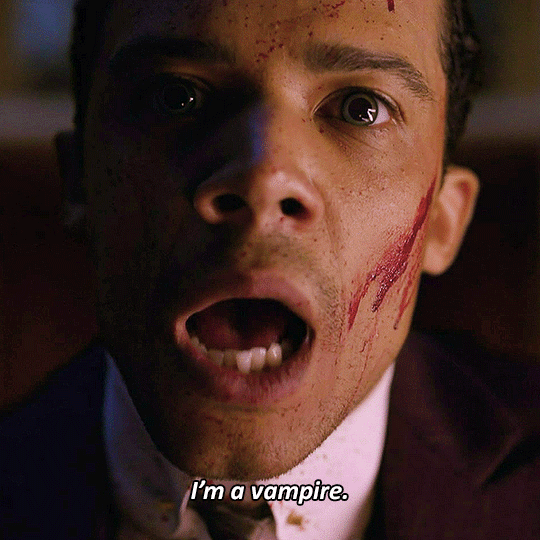
“I must confess, I’m very proud of you Louis. It goes against much of my teaching, but you managed to execute it with such aplomb.” – Lestat de Lioncourt
“I didn’t do it for me, I did it for my city, for my people. Destroy our businesses and buy the land for cheaper. I know what they doing.” – Louis de Pointe du Lac
Lestat is proud, and wants to make it their anniversary, turning a willfully ignorant blind spot once again to the reality of humanity that Louis can’t help but continue to be caught up in. Louis’ vampirism aligns with his activism, just like he wants so that he can feel good about what he is. Lestat tells Louis he’s proud while also calling out his mistake and that what he did might not have actually helped anyone but himself. Of course, he did this in Lestat fashion, not exactly in the supportive way Louis could have benefited from. He ignores the reality of the human implications that Louis’ actions have caused because he doesn’t care, he doesn’t have to care, and it doesn’t affect him. Not really. He has money regardless of The Azalea being taken from them. So he focuses on what he does care about: Louis coming around to his nature, that he enjoyed killing Fenwick merely because he could, because it felt good, not because of what Louis was hoping it would do.
Lestat tries to continue their romance amidst Louis’ worry, but he continues to reject him. Louis is going through his own evolution and dark night of the soul. Lestat is already past his (and forgets that?), it seems, and he expects Louis to breeze past his to meet him emotionally centuries later to say, fuck the world! We’re just a couple of vampires who like to fuck and be merry. Wouldn’t that be nice and easy? Lestat brought Louis’ rejection and hurtful words (“And that’s why you and me ain’t never gon’ work”) upon himself in many ways. And yet, the expression on his face is heartbreaking and shows how truly hurt he is. It makes us feel for him even when we know he’s wrong.
Unfortunately, the consequences that this has on Louis’ people in other neighborhoods are brutal. The white citizens retaliate in numbers, burning Storyville to the ground, and Louis, desperate for some salvation or to alleviate his own guilt, saves a girl from a burning fire.
I ran from the quarter that night, ran to where the violence spread most wild. I stumbled through the streets like an irrational child who had tested his strength on the small bird and now asked, “Can I make it whole again?” Their faces raced past me, like snow in a terrible wind, unaware that it was I who brought this retribution. It was I who should pay for this sin. And then, one of those inconceivable moments where who you were before and who you would be forever after is marked in time.
In the book (I’ve continued reading!), Louis also finds this girl, but he almost murders her as his hunger grows too strong for animal blood—this was to illustrate his rattling with his own nature as this episode addresses. In the film, Louis simply finds her orphaned by the plague as he’s wandering the gutters looking for food—pure Brad Pitt could never kill a child! In the show, however, there is an added depth to the discovery of this young girl and the events that build up to it. Louis isn’t just a pathetic vampire who recoils at the thought of eating humans—he cares about humanity, he’s empathetic—he’s also feeling guilty that what he did, however justified, harmed the lives of hundreds (or more) of innocent Black people, his people. A neighborhood that he and his father owned businesses in.
This is truly Louis’ episode. Jacob Anderson’s Louis is going through an existential awakening, a journey of his own soul, and once this starts happening, we almost forget Lestat as Louis does. He fades into the background for the rest of the episode after the soldier party until their last exchange, which is a great visual effect for what we’re meant to focus on. We’re in Louis’ world right now, and Lestat is only a part of that world, despite wanting to be the star of Louis’ show.
Tell me what you think…
Does Louis REALLY like Jonah or just trying to make Lestat jealous?
Do you believe that Lestat doesn’t like Antoinette and won’t see her again?
Do you think that Lestat bringing the army men home was sincerely to bring him and Louis closer, to bring Louis something he likes that they could enjoy together, or to mess with Louis? Or both?
Do you think Lestat “went quiet” on purpose to see how Louis would react to what was happening around him or do you think Louis was just so caught up in what was happening that he forgot about him?
Do you think Louis saving the girl from the fire will assuage his guilt?
Or anything else that stood out to you in this episode! Every week is so much to unpack, and they do such a great job building upon each one.
‘Til next week, with our favorite vampires and a new addition.


